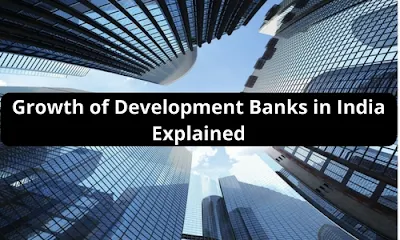
Introduction
Development banks are specialised financial institutions providing medium and long term financing to private enterprises. The growth of Development banks after independence is incredible strengthening the capital market to a large extent.Objectives of Development Banks
- To provide finance
- To encourage and motivate entrepreneurs
- To prepare development or business plans
- To help, companies raise capital from the market
- To provide market information about export and domestic markets
- To undertake project evaluation
- To undertake promotional activities in specific field of operation
- To boost the spirit of entrepreneurship
- To develop industry and economy as a whole
History of Development Banks
- Industrial Finance Corporation of India (IFCI) was the first development bank to be established in 1948
- Industrial development bank established in 1955
- Industrial Development Bank of India (IDBI) set up as RBI subsidiary in 1964
- IDBI became autonomous in 1976
- Small Industries Development Bank of India (SIDBI) setup in 1990
- Industrial Investment Bank of India (IIBI) set up in 1991
- MUDRA Bank set up in 2016
- Apart from the above, there are State Industrial Development Corporations (SIDCs) and State Financial Corporation (SFC)
Functions of Development Banks
- Development banks are the largest source of long-term and medium credit to private industrial sector
- Raising capital for the companies is the primary function of the Development banks
- Development banks provide loans and advances
- Development banks perform underwriting of new issues
- Development banks provide guarantee for loans
- Development banks provide guarantee for deferred payments
- Development banks provide subscription to shares and debentures
- Development banks strengthen the capital market through guarantee of loans and underwriting
Difference between Development Bank and Commercial Bank
- Development banks main emphasis lies on development through various promotional activities while commercial banks are mere credit suppliers
- Development banks do not accept deposits from public while commercial banks accept deposits
- Industry and corporate are the focus target market for development banks while commercial banks target varies from individuals to corporate
- Development banks are normally viewed to provide medium and long-term finance while commercial banks provide short term finance
- Development banks focus on industrial development while commercial banks cater to various needs and developments
Industrial Finance Corporation of India (IFCI)
- IFCI provides long term and medium finances to large scale industries only
- It place special emphasis to provide credit for renovation and expansion of plants and setting up new ventures especially to public limited companies
- Repayment is within 25 years
- Small scale industries are not financed by IFCI
Industrial Development Bank of India (IDBI)
- IDBI was initially established as RBI subsidiary in 1964 and became autonomous in 1974
- It is now an Independent public sector financial institutions under GOI
- IDBI has a strong and pivotal role in the Indian Industrial development
- Set up to provide long-term finance to Indian industries
- IDBI was established as the apex institution to coordinate the activities of the existing financial institutions providing long-term finance
- IDBI finances the industrial units in three ways
b. The indirect manner in the form of refinancing of loans and advances
c. Promotional activities in small industries and backwards areas
Small Industrial Development Bank of India (SIDBI)
- Small Industrial Development Bank of India (SIDBI) was established in 1990 to ensure adequate and timely availability of financial assistance to small scale sector
- Focus only on small scale industries
- Act as agents in providing factoring and leasing services to small scale industrial units
- Discounting and rediscounting of bills arising from machinery and equipment sale
- Refinancing of advances and loans extended to small scale industries by primary lending institutions
- Granting of loans for financing exports of products manufactured by small scale industries
- Extending financial support to state industries
Industrial Investment Bank of India (IIBI)
- IIBI set up in 1991
- IIBI has taken over the operations of Industrial Reconstruction Bank of India (IRBI)
- IRBI was working to revive the sick industrial units
- IIBI enjoys the same status as IDBI, ICICI etc
- IIBI main function is to revive the sick industrial units in India
- It also finances the development and promotion of other industries in India State Financial Corporations (SFC)
- SFC are the premier state level agencies catering to long-term financial needs of medium and small size companies
- SFC Act was passed in 1951
- First SFC was established in the year 1953
- At present, each state in India has an SFC accounting to 26 SFCs
- Financial assistance provided with a repayment period of 20 years
- Underwriting of shares, debentures and bonds by small and medium sized industrial undertakings
- SFCs act as the agent of central government or of IDBI, IFCI etc in offering finance to the industry
MUDRA Bank
- In the month of January 2016, Government of India approved the Mudra conversion to MUDRA bank
- Mudra Bank provides credit or loan to micro and small industries in three categories
- Shishu scheme provides loans up to Rs. 50000
- Kishor from Rs. 50000 to Rs. 5 lakh
- Tarun from Rs. 5 lakh to Rs. 10 lakh


